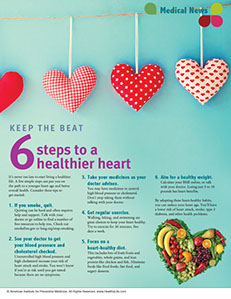SYMPTOM CHECKER
CONDITIONS
Male
Female
Child
Arm, Hand & Shoulder Concerns
Legs & Feet Concerns
Dental & Mouth Concerns
Ear & Nose
Eye Conditions
Head Conditions
Arm, Hand & Shoulder Concerns
Legs & Feet Concerns
Front
Back
Arm, Hand & Shoulder Concerns
Dental & Mouth Concerns
Ear & Nose
Eye Conditions
Head Conditions
Arm, Hand & Shoulder Concerns
Dental & Mouth Concerns
Ear & Nose
Eye Conditions
Head Conditions
Front
Back
Arm, Hand & Shoulder Concerns
Neck Links
Head & Neck Concerns
Arm, Hand & Shoulder Concerns
Neck Links
Head & Neck Concerns
Front
Back
Online Clinic
Wise Healthcare
6 steps to a healthier heart

Print on Demand
It’s never too late to start living a healthier life. A few simple steps can put you on the path to a younger heart age and better overall health. Consider these tips to get started:
1. If you smoke, quit. Quitting can be hard and often requires help and support. Talk with your doctor or go online to find a number of free resources to help you. Check out smokefree.gov or lung.org/stop-smoking.
2. See your doctor to get your blood pressure and cholesterol checked. Uncontrolled high blood pressure and high cholesterol increase your risk of heart attack and stroke. You won’t know if you’re at risk until you get tested because there are no symptoms.
3. Take your medicines as your doctor advises. You may have medicines to control high blood pressure or cholesterol. Don’t stop taking them without talking with your doctor.
4. Get regular exercise. Walking, biking, and swimming are great choices to keep your heart healthy. Try to exercise for 30 minutes, five days a week.
5. Focus on a heart-healthy diet. This includes lots of fresh fruits and vegetables, whole grains, and lean protein like chicken and fish. Minimize foods like fried foods, fast food, and sugary desserts.
6. Aim for a healthy weight. Calculate your BMI online, or talk with your doctor. Losing just 5 to 10 pounds has heart benefits.
By adopting these heart-healthy habits, you can reduce your heart age. You’ll have a lower risk of heart attack, stroke, type 2 diabetes, and other health problems.
This website is not meant to substitute for expert medical advice or treatment. Follow your doctor’s or health care provider’s advice if it differs from what is given in this guide.
The American Institute for Preventive Medicine (AIPM) is not responsible for the availability or content of external sites, nor does AIPM endorse them. Also, it is the responsibility of the user to examine the copyright and licensing restrictions of external pages and to secure all necessary permission.
The content on this website is proprietary. You may not modify, copy, reproduce, republish, upload, post, transmit, or distribute, in any manner, the material on the website without the written permission of AIPM.
2021 © American Institute for Preventive Medicine - All Rights Reserved. Disclaimer | www.HealthyLife.com















































